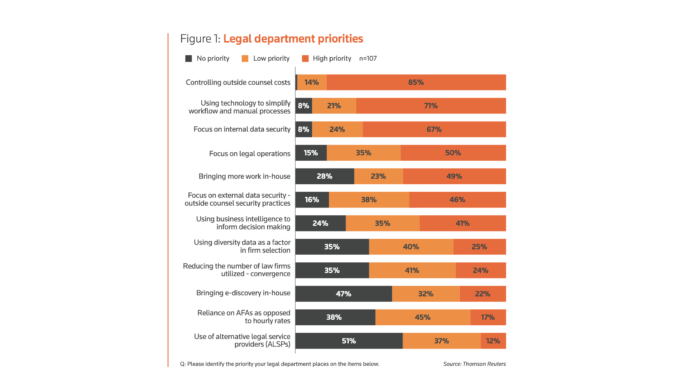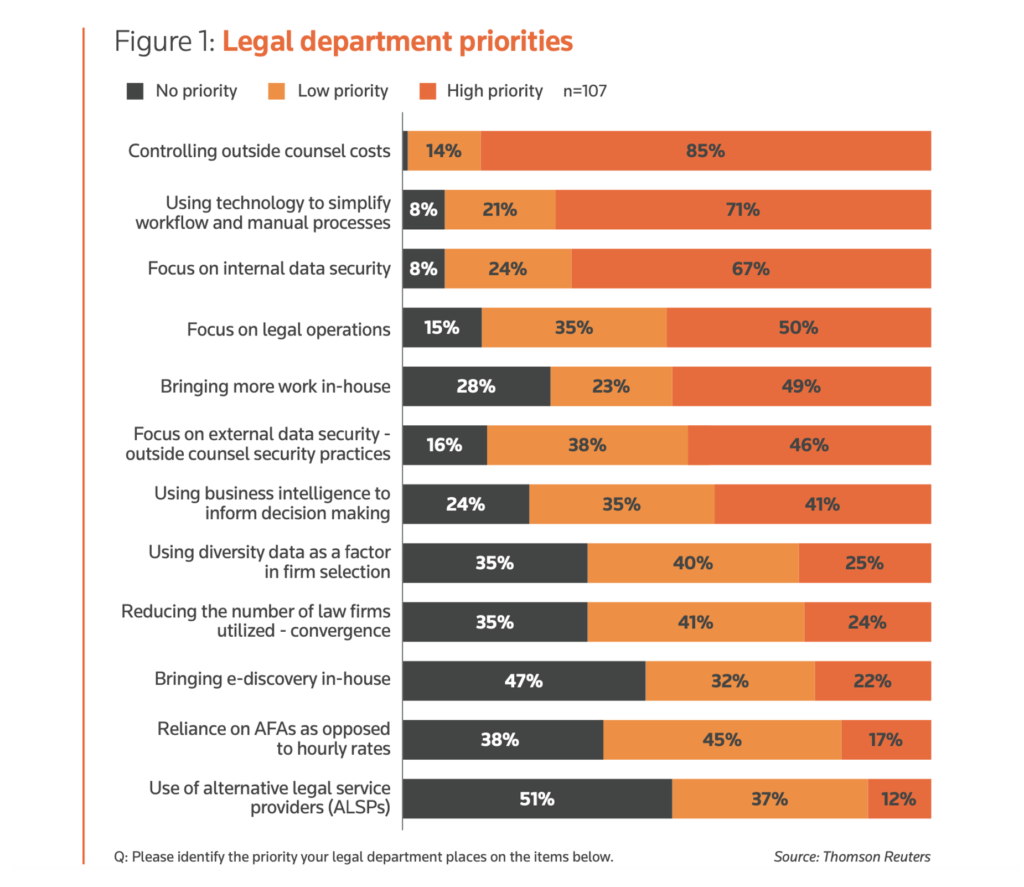
New data from the Thomson Reuters ‘Law Department Operations (LDO) Survey 2022’ shows that the top two priorities for inhouse teams as we face a recession are: ‘using tech to simplify workflows and manual processes’ and ‘controlling outside counsel costs’.
The two elements combined (see table below) are a transformative mix and make a lot of sense. Although, perhaps surprisingly interest in tapping what ALSPs have on offer was weak – which to this site seems something of a paradox. Here are some thoughts:

- Although inhouse teams will no doubt keep handing the most high-risk and business critical work to law firms (and they’d be daft not to…) when it comes to process work that area can be handled in other ways.
- This survey shows that inhouse teams will likely bring more of that work inhouse, which is meant to be more economical (and often is).
- But, if you do that then your team will get bogged down, and as seen in the Axiom report in AL yesterday (see here), too much process work leads to burnout and unhappy counsel, e.g. 47% of inhouse lawyers are already burned out or very stressed. Heap more process work onto their desks and they may well snap.
- You need to find a better way to handle that process work so that it doesn’t crush your inhouse team. One positive is that it now looks like inhouse departments are looking to utilise more tech to help, and no doubt they are thinking about: CLM and other contract management systems, doc automation in general, as well as better automation of processes, and also self-serve facilities. That should help take the edge off the process work – if it’s implemented well….(but that’s another story….)
- But, it would also make sense to do two other things: A) send more of the process work out to Legal Managed Services provided by ALSPs (or those of law firms), which are purpose-built for such work and can do it more economically and are experts in this area; and also B) rely more on flexible lawyers to cope with surges in work without having to hire in new staff if you are facing cost constraints.
- Just moving the same kinds of work done in the same way from one place to another will not solve the systemic challenges clients face. They need to get into the root causes, and with the interest in tech there is some good news here. But, perhaps more can be done to re-think the ‘means of production’ and seek out lasting positive change.
Any road, overall the focus on legal tech is very welcome, even if the lack of interest in ALSPs seems counterintuitive.
But, the client is always right…, right? So, they must have good reasons for this lack of appetite for ALSPs. Perhaps they are not delivering what the companies want, or not living up to expectations, rather like an over-sold legal tech startup? It’s hard to know and we need more research here to understand this lack of love for ALSPs.
P.S. The level of interest in not using billable hours…….well, this is only a high priority for 17% – another seemingly logical thing to change that would help inhouse teams, but which stubbornly refuses to budge. Although we should be perhaps grateful for those happy few in the 17% bracket.
The full report can be found here.
Methodology: The data in this year’s LDO Index Survey is comprised of real-world legal spend analytics gathered from Thomson Reuters’ Legal Tracker and sourced from more than 1,500 corporate law departments. Complementing that data is a Thomson Reuters survey, conducted in August and September 2022, to which 107 legal departments responded.